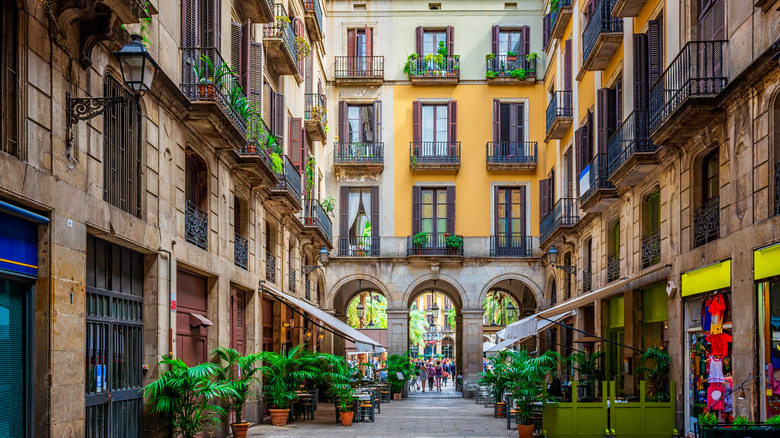The Crucial Reason You May Want To Avoid Staying At Airbnb's, According To Rick Steves
When traveling abroad, there's certainly an appeal to staying in an Airbnb. After all, you can get an entire flat to yourself rather than a hotel room and save money by doing your own cooking. However, there's a major downside: the impact on local residents who are being priced out of their neighborhoods, a concern shared by Rick Steves, who advises travelers to avoid staying at Airbnbs.
"When you go to Europe, you can consume in a way that doesn't dislocate pensioners and ruin neighborhoods. Landlords anywhere in the world can make more money renting to short-term tourists than long-term local people," Rick Steves told The New York Times. "So, if you complain that a city is too touristy and you're staying in an Airbnb — well, you're part of the problem."
In fact, more and more countries are putting restrictions on Airbnbs, largely due to concerns that locals are being priced out of their neighborhoods. Some of the tighter restrictions can be found in popular tourist destinations like Berlin, Rome, Barcelona, and the entire country of Portugal.
The impact of Airbnbs on locals
Based on the accounts of locals in areas impacted by an influx of Airbnbs, the effect on individual families can be devastating. In an interview with The Guardian, Cherylyn Houston of Dinorwig in northern Wales recounted being given six months' notice to vacate the cottage where she lived with her husband and children. The reason? Her landlady said she could make four times as much by turning it into an Airbnb.
Despite submitting multiple applications, Houston was unable to find a new long-term rental in her price range, The Guardian reported. As a result, the family ended up spending four months in a B&B that lacked basic amenities like a washer and hot water before the local council offered her a three-bedroom rental in a nearby village.
In 2020, Fernando Medina, the then-mayor of Lisbon, Portugal, wrote about the housing crisis in a column for The Independent. "Essential workers and their families have increasingly been forced out as Airbnb-style holiday rentals have taken over a third of Lisbon's city centre properties, pushing up rental prices, hollowing out communities and threatening its unique character," he wrote.
Cities and countries are taking steps to curb Airbnb and short-term rentals
Popular vacation destinations are beginning to put laws in place that restrict Airbnbs. For example, New York City recently passed a regulation that an Airbnb stay must be for a minimum of 30 nights; the site's listings dropped from 22,000 to 3,000 after the rule was put in place, as reported by Business Insider.
Abroad, many European cities are putting similar measures in place. According to Domus, Barcelona has banned renting individual rooms entirely, while Airbnb hosts in Amsterdam can book a maximum of 30 nightly rentals throughout the full year.
In February 2023, Portugal passed a nationwide law banning new Airbnbs licenses, as reported by Business Insider. "There is no city that can remain authentic if it isn't able to maintain its residents," Prime Minister Antonio Costa, the former mayor of Lisbon, stated in a press conference.
When the smaller city of Irvine, California put a ban on short-term rentals in 2018, it saw long-term monthly rent decrease by 3% (or by an average $114 dollars), Business Insider reports. It remains to be seen if restrictions in larger cities and popular tourist destinations will have a similar impact on local long-term renters, but the stricter regulations are certainly a start.


